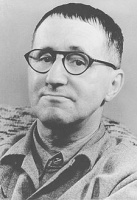| 贝尔托·布莱希特 | |||||
| 贝托尔德·布莱希特 | |||||
Read works of Bertolt Brecht at 小说之家 | |||||
From his late twenties Brecht remained a life-long committed Marxist who, in developing the combined theory and practice of his 'epic theatre', synthesized and extended the experiments of Erwin Piscator and Vsevolod Meyerhold to explore the theatre as a forum for political ideas and the creation of a critical aesthetics of dialectical materialism. Brecht's modernist concern with drama-as-a-medium led to his refinement of the 'epic form' of the drama. This dramatic form is related to similar modernist innovations in other arts, including the strategy of divergent chapters in James Joyce's novel Ulysses, Sergei Eisenstein's evolution of a constructivist 'montage' in the cinema, and Picasso's introduction of cubist 'collage' in the visual arts. In contrast to many other avant-garde approaches, however, Brecht had no desire to destroy art as an institution; rather, he hoped to 're-function' the theatre to a new social use. In this regard he was a vital participant in the aesthetic debates of his era—particularly over the 'high art/popular culture' dichotomy—vying with the likes of Adorno, Lukács, Bloch, and developing a close friendship with Benjamin. Brechtian theatre articulated popular themes and forms with avant-garde formal experimentation to create a modernist realism that stood in sharp contrast both to its psychological and socialist varieties. "Brecht's work is the most important and original in European drama since Ibsen and Strindberg", Raymond Williams argues, while Peter Bürger dubs him "the most important materialist writer of our time".
Collective and collaborative working methods were inherent to Brecht's approach, as Fredric Jameson (among others) stresses. Jameson describes the Author|creator of the work not as Brecht the individual, but rather as 'Brecht': a collective subject that "certainly seemed to have a distinctive style (the one we now call 'Brechtian') but was no longer personal in the bourgeois or individualistic sense". During the course of his career, Brecht sustained many long-lasting creative relationships with other writers, composers, scenographers, theatre directors, dramaturgs and actors; the list includes: Elisabeth Hauptmann, Margarete Steffin, Ruth Berlau, Slatan Dudow, Kurt Weill, Hanns Eisler, Paul Dessau, Caspar Neher, Teo Otto, Karl von Appen, Ernst Busch, Lotte Lenya, Peter Lorre, Therese Giehse, Angelika Hurwicz, Carola Neher, and Helene Weigel herself. This is "theatre as collective experiment [...] as something radically different from theatre as expression or as experience".
There are few areas of modern theatrical culture that have not felt the impact or influence of Brecht's ideas and practices; dramatists and directors in whom one may trace a clear Brechtian legacy include Dario Fo, Augusto Boal, Joan Littlewood, Peter Brook, Peter Weiss, Heiner Müller, Pina Bausch, Tony Kushner, Robert Bolt and Caryl Churchill. In addition to the theatre, Brechtian theories and techniques have exerted considerable sway over certain strands of film theory and cinematic practice; Brecht's influence may be detected in the films of Jean-Luc Godard, Lindsay Anderson, Rainer Werner Fassbinder, Joseph Losey, Nagisa Oshima, Ritwik Ghatak, Lars von Trier, Jan Bucquoy and Hal Hartley.
